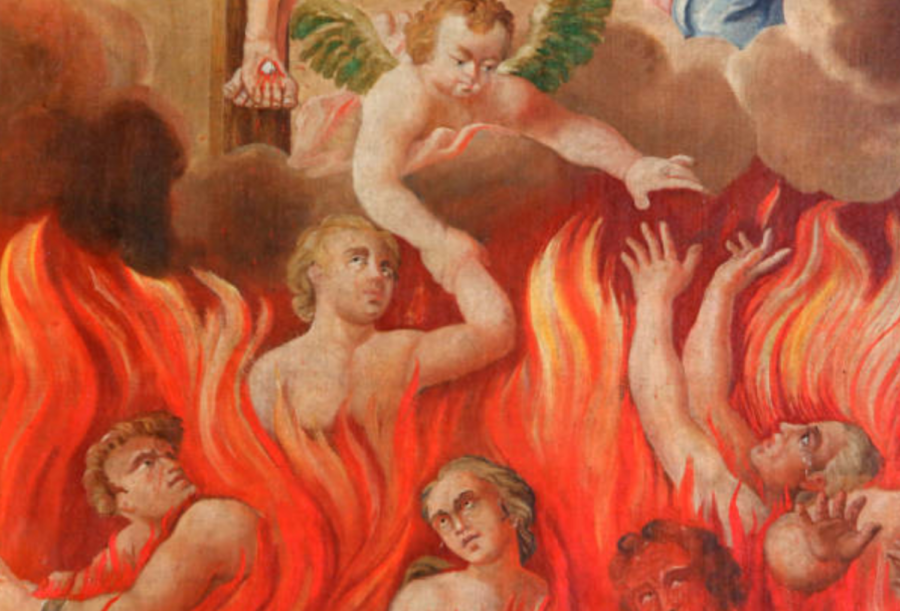Hamel: The particles of purgatory
June 4, 2021
There is one religious denomination that believes in a space between life and death. It’s a space between a rock and a hard place. The determiner of fate, if you will.
Purgatory is “the condition, process or place of purification or temporary punishment in which … the souls of those who die in a state of grace are made ready for heaven.” Hefty.
Purgatory is a unique facet of Roman Catholic beliefs. The origins of purgatory are not easy to pin down, so I will not explain it here, but I will give you a start. Although Catholic, the basis of purgatory, much like other grand Christian beliefs, is driven by the salvation of Jesus Christ himself. The Church takes the notion of being “unclean” quite seriously, for “nothing unclean shall enter [heaven]” (Revelations 21:27).
Some may call it the “temporal punishment” caused by excess sin, where an individual sent to heaven needs special attention and cleansing in order to pass through.
If you’re the common skeptic and want to know where it is in the Bible, here are a few examples. For those who are not skeptics, watch the various arguments refuting the existence of purgatory. You may find them interesting, but I’m only here to explore purgatory itself, not argue whether its existence is real.
Hebrews 9:27: “And just as it is appointed for mortals to die once, and after that the judgment.”
Isaiah 4:4: “When the Lord has washed away the filth of the daughters of Zion, and purged the blood of Jerusalem from her midst, by the spirit of judgment and by the spirit of burning.”
The New Advent describes the process as follows: “God requires satisfaction, and will punish sin, and this doctrine involves as its necessary consequence a belief that the sinner failing to do penance in this life may be punished in another world, and so not be cast off eternally from God.”
Most often, purgatory is pictured as a fiery, burning volcano, but to Catholics, it’s a beautiful cloud lounge. They believe purgatory to be a calm, resolving place. There isn’t pain or agony, just clarity.
But who goes to purgatory? There is usually a lot of confusion concerning where purgatory is ordered in the process of “passing on.” It’s a fork in the road; the left to heaven and the right to hell.
Purgatory is border patrol. You need a passport or a visa to pass from one side to another. Your qualifications, or your belief in and devotion to the sacramental God, is necessary. You must be “saved,” and you must be devoted.
If you haven’t already preplanned your trip to Disney or jumped over the electrical fence, then you have to pass through border control.
Let’s spin religion’s role in humanity real quick. Humans die. We know that. As previously stated in another column, our only certainty in life is our death. We can’t comprehend it, and, in the end, I don’t think we want to.
Say I’m not religious and I’m viewing religion in strictly an epistemological perspective. What if religion was just a way for humans to cope with the dreary ends and probabilities that can happen on earth? It brings light, peace and purpose. We are here to make a difference and play a very special role on this floating, spherical rock. (Remember, not all rocks are spherical.)
Zaleski says, “Purgatory answers the human need to believe in a just and merciful cosmos, one in which ordinary people, neither hardened sinners nor perfect saints, may … balance life’s accounts, … cleanse accumulated defilements and heal troubled memories.” That’s a sweet deal.
If I were to think purgatory into a physical space, I would say purgatory is between the moment you die and the moment your body’s electricity comes to an imminent stop.
There is a gap of time where your brain stays active despite there being no blood pumped throughout your body. This time is variable, from seconds to several minutes (up to 10, to be exact). “All consciousness and sensory awareness is lost almost immediately after decapitation [of mice within the study] (within 10 seconds); however, neurons remain active.” In Layman’s terms, the bodily death is much different than the death of the brain.
So, is our conception of the time of death wrong? Or are there two times of death?
What if God held His judgement from the moment blood stops pumping to the moment the brain stops thinking? Assuming, in purgatory, different people needed more time to be “cleansed” than others — upon the variable measure of one’s sin. Some brains take longer than others to stop “thinking.” Logically, this makes sense. Realistically, we will never know.
I believe there to be two times of death. The one where the doctors call the shots, your families say goodbye and you take your last breath, and the one where your brain holds on a little longer, taking its own little moment to breathe. It’s the one last chance to make amends with yourself. Your own final moments of peace.
If it turns out to be purgatory, so be it. It will never be up to me anyway.







